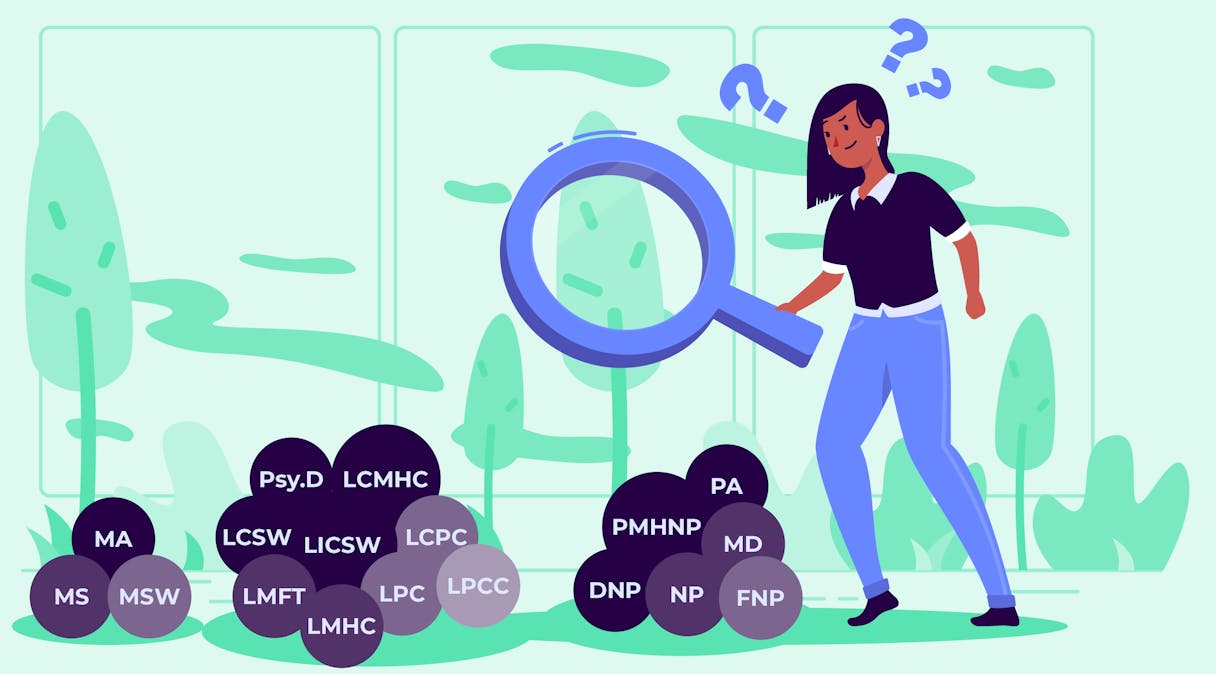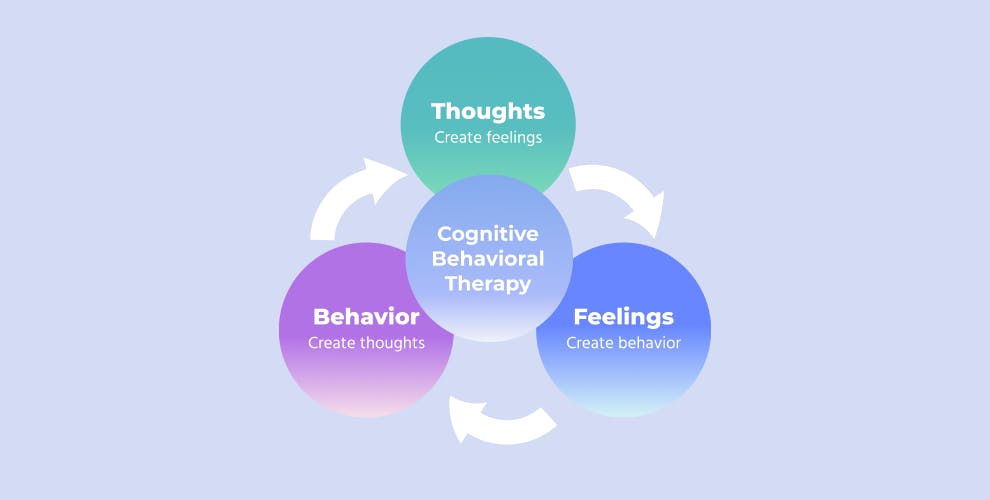Mental health issues, such as depression, anxiety, PTSD, and substance misuse, can take a heavy toll. Mental health services can help in providing relief, but making time to see a professional isn’t always easy— particularly for those who live far away from a doctor's office or have busy schedules. The solution: online mental health treatment.
Online mental health treatment offers a convenient and accessible way to get a recommended treatment plan by working with a licensed prescriber remotely. To start, you may be asked to complete a questionnaire to share your symptoms and medical history. You may also need to schedule a video consultation with a medication prescriber or other healthcare provider. During the consultation, the prescriber will discuss your symptoms and treatment options with you.
In this article, we'll dive into how online treatment plans can provide the tools you need to lead the life you want.
Addressing depression and anxiety
Depression and anxiety are two common mental health disorders, affecting people of all ages. While there is no one-size-fits-all treatment for either condition, medication can be an effective way to manage symptoms and improve quality of life.
Telehealth offers a holistic approach, incorporating therapy sessions and medication management. The virtual nature of telehealth plans eliminates barriers like transportation and scheduling conflicts, making consistent care more achievable.
Several different medications can be prescribed for depression and anxiety. Some common medications include:
Antidepressants: Antidepressants work by increasing levels of certain neurotransmitters in the brain, such as serotonin, norepinephrine and dopamine. These neurotransmitters are thought to play a role in mood regulation and emotions. A few common antidepressants include:
- Citalopram (Celexa)
- Escitalopram (Lexapro)
- Fluoxetine (Prozac)
- Sertraline (Zoloft)
- Amitriptyline (Elavil)
- Bupropion (Wellbutrin)
- Trazodone (Desyrel)
- Mirtazapine (Remeron)
- Vortioxetine (Trintellix)
- Duloxetine (Cymbalta)
- Desvenlafaxine (Pristiq)
- Venlafaxine (Effexor)
Anti-anxiety medications: Anti-anxiety medications can help reduce symptoms of anxiety, such as worry, restlessness, and physical symptoms such as rapid heart rate and sweating. A few common anti-anxiety medications include:
- Buspirone (Buspar)
- Hydroxyzine (Vistaril)
Navigating PTSD and stressful life events
Post-Traumatic Stress Disorder (PTSD) and the aftermath of stressful life events can create a profound impact on an individual's emotional well-being, often leading to debilitating symptoms that affect daily life. Telehealth treatment plans recognize the sensitivity of these experiences and offer a safe and confidential space for individuals to openly discuss their traumas. This level of comfort is particularly crucial for those hesitant to seek help in traditional settings, where the stigma surrounding mental health may act as a deterrent.
A prescriber may recommend antidepressants, anti-anxiety medications, or other pharmaceuticals to complement therapy sessions. The prescriber collaborates closely with patients to fine-tune medication plans based on their unique needs and responses. This personalized approach ensures that the medication component of the treatment plan is not only effective but also mindful of individual sensitivities and preferences.
Tackling mood disorders
Individuals grappling with severe mood swings can benefit from the convenience of virtual check-ins, providing regular opportunities to discuss their symptoms with healthcare professionals. This ongoing dialogue allows for timely adjustments to medication dosages or types, allowing treatment to evolve in response to the individual's needs.
Some commonly prescribed medications to help manage mood disorders include:
Mood stabilizers
- Divalproex sodium (Depakote)
- Carbamazepine (Tegretol)
- Lamotrigine (Lamictal)
- Quetiapine (Seroquel)
- Lurasidone (Latuda)
- Valproate (Depakote)
Overcoming sleep trouble
Sleep troubles, a common companion to mental health challenges, establish a detrimental cycle of fatigue and emotional instability. Medication can help regulate sleep patterns and give relief to sufferers. Virtual sessions facilitate regular monitoring and adjustments, ensuring that individuals receive tailored support to escape the grip of sleep-related challenges.
Doxepin (Silenor) is an FDA-approved medication commonly prescribed for sleep troubles.
This pharmacological intervention is complemented by therapy sessions that delve into the underlying causes of insomnia or other sleep disorders. By addressing both the symptoms and root causes, telehealth treatment plans offer a holistic approach to promoting restful sleep and improved emotional resilience.
Mitigating ADHD-related focus and concentration issues
ADHD-related focus and concentration issues can affect one’s productivity and overall well-being. With a telehealth treatment plan, a prescriber may recommend medications that can enhance cognitive function, promoting improved focus and concentration levels.
Here are some examples of medications commonly used to improve focus and concentration:
- Atomoxetine (Strattera)
- Guanfacine (Intuniv)
- Clonidine (Kapvay)
- Bupropion (Wellbutrin)
Simultaneously, therapy sessions play a key role in identifying and addressing the underlying issues contributing to difficulties concentrating, such as stress, anxiety, or attention-related disorders. The combination of medication and therapeutic support within the online framework ensures a comprehensive approach to bolstering cognitive abilities.
Confronting substance and alcohol abuse
Addressing substance and alcohol misuse demands a comprehensive strategy, and online medication plans prove to be instrumental in this multifaceted approach. Medications used for substance and alcohol abuse aim to assist individuals in managing cravings, reducing withdrawal symptoms, and supporting them in maintaining sobriety.
Here are some medications commonly prescribed for substance and alcohol misuse treatment:
- Disulfiram (Antabuse)
- Naltrexone (Revia, Vivitrol)
- Acamprosate (Campral)
Combining medication with therapeutic support provides a holistic approach to individuals seeking to overcome the hurdles of substance and alcohol abuse, fostering a pathway toward lasting recovery.
See a prescriber and fill your Rx with Cerebral
Cerebral provides access to licensed prescribers who follow evidence-based practices when exploring treatment options and work with you to develop a treatment plan based on your needs and goals. Follow-ups are included with the monthly prices, as is access to CerebralRx, our in-house pharmacy.
With CerebralRx you can easily fill your mental health medication prescription and get it delivered discreetly to your door with free, 2-day shipping. Plus, we’ve lowered the cost of medication so you enjoy savings up to 80% off retail pharmacy prices. Click for a list of some of the medications we offer.

Why Can’t We Talk About Suicide?

Understanding Mental Health Titles for Psychiatrists, Therapists & more

Cognitive Behavioral Therapy (CBT) Exercises in the Cerebral App!

Call 911 if you’re having a
mental health emergency
Text Home to 741-741 if you're in emotional
distress and need immediate support
Call or text 988 Suicide &
Crisis Lifeline. Chat service
is available at 988lifeline.org.